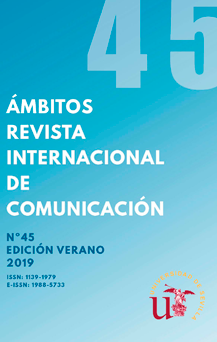On the problem of objectivity: between rationality, representation and ideology
DOI:
https://doi.org/10.12795/Ambitos.2019.i45.05Palabras clave:
Objectivity, ideology, rationality, representation, philosophy of communicationResumen
Despite all the contemporary discussion about the relativity of the points of view, the value of "objectivity" seems still quite present mainly in the narrative of the media about itself. In this article, we will try to demonstrate how this notion of "objectivity" can be reinterpreted, in the limit, as an ideological expression. For this, we will focus on the notion of "objectivity" problematized by the Brazilian philosopher Marilena Chaui. We will make a journey based on specific writings of the extensive work of the philosopher, writings that were revised and improved in different texts in the last years. Our path will present, at first, an overfly by the definition made by Chaui about the term "ideology", going to the theme of its relationship with the idea of "objectivity", especially in regard to the role of the "objectivity" in the construction of the "ideology". Such concepts are quite opportune in the reflection on the new arrangements of public sphere after the explosion of digital communications. Because of this, we conclude with a brief discussion about the actual and complex problem of the post-truth and "fake news". We assume here the ongoing character of our analysis, beyond the option for the definition of this specific cut as a way to present one within the innumerable possibilities of discussion of the controversial issue of objectivity.
Descargas
Citas
Chaui, M. (2014). A ideologia da competência. In: A ideologia da competência. Belo Horizonte: Autêntica / São Paulo: Fundação Perseu Abramo.
Chaui, M. (2013). Crítica e ideologia. In: Manifestações ideológicas do autoritarismo brasileiro. Belo Horizonte: Autêntica / São Paulo: Fundação Perseu Abramo.
Chaui, M. (1981). Cultura e democracia. São Paulo: Moderna.
Chaui, M. (1989). Cultura e democracia. São Paulo: Cortez.
Chaui, M. (1995). O que é ideologia. São Paulo: Brasiliense.
D'Allonnes, M. R. (2018). La faiblesse du vrai: ce que la post-vérité fait à notre monde commun. Paris: Seuil.
D'Ancona, M. (2017). Post-vérité: guide de survie à l'ère des fake news. Paris: Plein Jour.
Ferraris, M. (2019). Postvérité et autres énigmes. Traduit de l'italien par Michel Orcel. Paris: PUF.
Horkheimer, M. (2002). Notes on science and the crisis [1932]. In: Horkheimer, M. Critical Theory: selected essays. Translated by Matthew J. O'Connell and others New York: The Continuum Publishing Company.
Horkheimer, M. (1992). Traditionelle und kritische Theorie: Fünf Aufsätze [1937]. Berlin: Fischer Taschenbuch.
Huyghes, F.-B. (2018). Fake news: la grande peur. Versailles: VA Éditions.
Lefort, C. (1979). As formas da história: ensaios de antropologia política. São Paulo: Brasiliense.
Lyotard, J.-F. (1979). La Condition postmoderne. Paris: Les Éditions de Minuit.
Marx, K.; Engels, F. (1998). The German Ideology [1846]. New York: Prometheus Books.
Vattimo, G. (2011). La societá trasparente [1989]. Milano: Garzanti.
Venturini, T. (2018). Sur l'étude des sujets populaires ou les confessions d'un spécialiste des fausses nouvelles. In: Sauvageau, F.; Thibault, S.; Trudel, P. Les fausses nouvelles: nouveaux visages, nouveaux défis. Comment déterminer la valeur de l'information dans les sociétés démocratiques? Québec: Presses de l'Université Laval.
Descargas
Publicado
Cómo citar
Número
Sección
Licencia
Ámbitos. Revista Internacional de Comunicación es una revista de acceso abierto, lo que significa que todo su contenido está disponible gratuitamente para el usuario o su institución. Los usuarios pueden leer, descargar, copiar, distribuir, imprimir, buscar o enlazar con el texto completo de los artículos, o utilizarlos para cualquier otro fin lícito, sin solicitar permiso previo al editor o al autor. Esta definición de acceso abierto se ajusta a la Iniciativa de Acceso Abierto de Budapest (BOAI).

A menos que se indique lo contrario, todo el contenido de la edición electrónica se distribuye bajo una " licencia internacional Creative Commons Attribution-NonCommercial-ShareAlike 4.0 ". Puede consultar la versión informativa y el texto legal de la licencia aquí. Esto debe indicarse expresamente de esta manera cuando sea necesario.
En caso de aceptación del manuscrito, los autores ceden los derechos de la obra para su publicación a Ámbitos. Revista Internacional de Comunicación bajo el contrato de licencia Reconocimiento-NoComercial-CompartirIgual 4.0 Internacional (CC BY-NC-SA 4.0). Los autores conservan los derechos de autor y terceros están autorizados a copiar, distribuir y hacer uso de la obra, siempre que cumplan con los términos y condiciones establecidos en la licencia.
- Citar la autoría y la fuente original de publicación (revista, editorial y URL de la obra).
- No los utilice con fines comerciales.
- Si remezcla, transforma o crea a partir del material, debe publicar sus contribuciones bajo la misma licencia que el original.
Se puede encontrar más información en https://creativecommons.org/licenses/by-nc-sa/4.0/deed.es



















